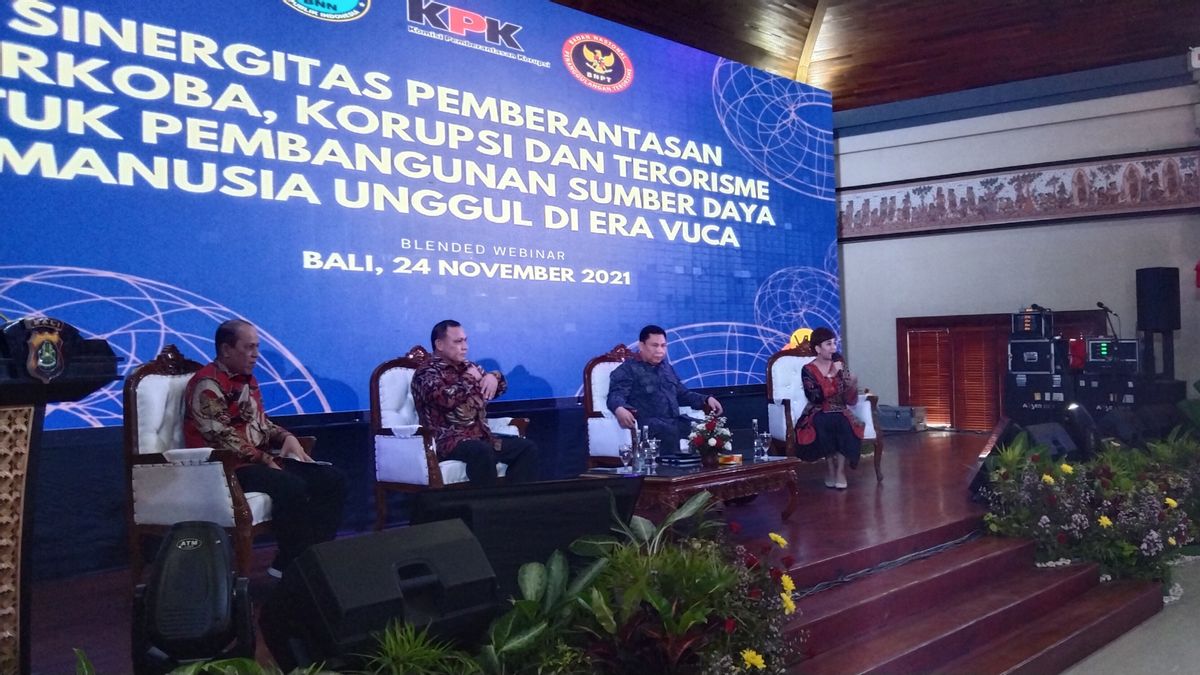DENPASAR - Chairman of the Corruption Eradication Commission (KPK) Firli Bahuri supports Attorney General ST Burhanuddin who wants to apply the death penalty for corruptors.
"I agree. In fact, I once said that a separate article needs to be made so that 30 criminal acts of corruption can be subject to the death penalty," said Firli Bahuri after attending the Synergy Combating Drugs, Corruption and Terrorism webinar at the Bali Police Headquarters, Denpasar, Wednesday, November 24.
Firli said that his party had conveyed the concept of the death penalty for corruptors. But he stressed that the implementation of the threat of punishment must follow the law.
"We, the KPK and all the children of the nation believe that the perpetrators of corruption must be sentenced to death. But remember that our country is a state of law. The consequence is that the law becomes the commander-in-chief," he said.
"All processes must follow legal procedures. The death penalty to this day is only regulated in Article 2 Paragraph 2 of Law 31 of 1999. The condition for the death penalty is a criminal act of corruption committed in a disaster situation or in certain circumstances. However, Article 2 paragraph 1 can be imposed against the perpetrator of corruption if he commits a criminal act of corruption Article 2 Paragraph 1," said Firli Bahuri.
As previously reported, Attorney General Burhanuddin said that the application of capital punishment to perpetrators of corruption has several problems, one of which is the rejection of human rights activities.
According to Burhanuddin, human rights activists have the support of the international community who encourage every country to abolish the regulation of the death penalty, on the pretext that the right to life is an absolute right that cannot be revoked by anyone except God.
"The refusal of these human rights activists certainly cannot be taken for granted. As long as the constitution provides juridical space and the crime is actually very detrimental to the nation and state, then there is no reason for us not to apply the death penalty," said Burhanuddin in a webinar held by the Faculty General Sudirman University Law, online, Thursday, November 18.
Burhanuddin said it is necessary to realize that the existence of 'human rights' must go hand in hand with 'human rights'.
In other words, said Burhanuddin, the state will always protect the human rights of every person, but on the one hand that person also has an obligation to respect the rights of others.
The Attorney General explained that the laying of the basic legal pattern of Pancasila by emphasizing the existence of a balance between rights and obligations is a must in order to create an orderly life in society, nation and state.
"In Article 28 I paragraph (1) of the 1945 Constitution, the right to life is a right that cannot be reduced under any circumstances," he said.
However, Burhanuddin continued, if viewed from the systematic preparation of articles that regulate the protection of human rights in the 1945 Constitution, it will appear that there is a limitation of human rights contained in the closing article.
The provisions in Article 28 J paragraph (1) of the 1945 Constitution have obligated everyone to respect the human rights of others in the orderly life of society, nation and state.
Then in the closing article on human rights, namely Article 28J paragraph (2) of the 1945 Constitution, it is stated that human rights can be limited and are not absolute.
"The state can deprive everyone of human rights if that person violates the law," said Burhanddin.
Thus, said the Attorney General, based on the provisions in Article 28J paragraph (2) of the 1945 Constitution, the imposition of capital punishment for corruptors who have been hindered by human rights issues can be enforced.
Another problem in the application of the death penalty to corruption, there is a view that requires the abolition of the death penalty with the argument that the death penalty does not reduce the quantity of crime.
The English, Chinese, Japanese, Arabic, and French versions are automatically generated by the AI. So there may still be inaccuracies in translating, please always see Indonesian as our main language. (system supported by DigitalSiber.id)













